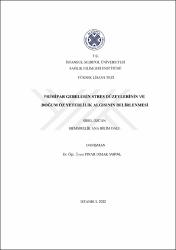| dc.contributor.advisor | Vural, Pınar Irmak | |
| dc.contributor.author | Özcan, Sibel | |
| dc.date.accessioned | 2023-11-17T13:28:15Z | |
| dc.date.available | 2023-11-17T13:28:15Z | |
| dc.date.issued | 2022 | en_US |
| dc.date.submitted | 2022-10-10 | |
| dc.identifier.citation | Özcan, S. (2022). Primipar gebelerin stres düzeylerinin ve doğum öz yeterlilik algısının belirlenmesi. (Yayımlanmamış yüksek lisans tezi). İstanbul Medipol Üniversitesi Sağlık Bilimleri Enstitüsü, İstanbul. | en_US |
| dc.identifier.uri | https://tez.yok.gov.tr/UlusalTezMerkezi/tezSorguSonucYeni.jsp | |
| dc.identifier.uri | https://hdl.handle.net/20.500.12511/11802 | |
| dc.description.abstract | Gebelerin bebek sağlığı ve gelişimi, annelik ile gelecek yaşam değişiklikleri, doğum ile ilişkili endişe gibi doğrudan gebeliğin kendisi ile ilgili yaşadığı stres doğuma yönelik öz-yeterlilik algısı ile beraber tüm doğum sürecini olumsuz etkileyebilmektedir. Bu çalışma primipar gebelerin stres düzeylerinin ve doğum öz yeterlilik algısının belirlenmesi amacıyla tanımlayıcı olarak planlandı. Araştırma Temmuz 2021-Aralık 2021 tarihleri arasında İstanbul'da bir Eğitim ve Araştırma Hastanesi, kadın doğum polikliniği ve NST birimine başvuran araştırmaya katılmaya gönüllü olarak kabul eden18 yaş ve üzeri 235 primipar gebe ile yürütüldü. Çalışma verileri araştırmacı tarafından yüzyüze görüşme tekniği ile Katılımcı Bilgi Formu, Gebelik Stresini Değerlendirme Ölçeği, Doğum Eyleminde Öz-Yeterlilik Ölçeği Kısa Versiyonu kullanılarak toplandı. Bulguların yorumlanmasında frekans tabloları ve tanımlayıcı istatistikler kullanıldı. Nonparametrik verilerin karşılaştırılmasında Mann Whitney U ve Kruskal Wallis testler, değişkenler arasındaki ilişkiye Spearman Korelasyon analizi kullanıldı. Çalışmaya katılan gebelerin yaş ortalaması 24,37±4,28, gebelik haftası ortalaması 34,88±3,21'dir. Doğum Eyleminde Öz-Yeterlilik Ölçeği ortalama puanı 219,50±40,60'dir. Gebelik Stresini Değerlendirme Ölçeği ortalama puanı 65,94±36,28'dir. Gebelerin %28,5'i ile eşlerinin de %29,4'ü lise mezunudur. Çoğunluğu (%72,3'ü) çekirdek aile içerisinde yaşayan kadınların %82,1'i çalışmamaktadır. %50,6'sı 1-5 yıl, %44,7'si 0-1 yıl evli olan kadınlarda eşlerinin %57'si serbest meslekte çalışmaktadır. Gebelerin çoğunluğunun (%60,9'u) geliri giderine denktir. Daha önce %13,6'sı gebelik yaşamış olan kadınların %6,8'si bir, %1,7'si iki ve %0,4'ü üç kere kendiliğinden düşük yaşamıştır. Gebelerin %95,7'si daha önce hiç kürtaj yaptırmadığını belirtmiştir. Çalışmadan elde edilen bulgulara göre, gebelerin stres düzeyi yükseldikçe, öz-yeterlilik algısının olumsuz yönde etkilendiği belirlendi. Ayrıca sonuçlar doğum öncesi bakımda stres etmenlerine odaklanılması ve kadınların annelik rolü ile ilgili beklentilerinin değerlendirilmesi gerektiğini vurgulamaktadır. | en_US |
| dc.description.abstract | Infant health and development of pregnancies, future life changes with motherhood, stress related to contraception itself can negatively affect the entire delivery process along with the perception of self-sufficiency towards birth. This study is planned as a descriptor for determining the stress levels and birth self-sufficiency of primitive pregnancies. The study was conducted from July 2021 to December 2021 with a primitive pregnancy aged 18 and over in Istanbul, volunteering to participate in research applying to an Education and Research Hospital, obstetrics and NST unit. The study data was collected by the researcher using a face-to-face interview technique using the Participant Information Form, the Pregnancy Stress Rating Assessment Scale, the Brief Version of the Self-Qualification Scale in Birth Action. Interpretation of the findings used frequency tables and descriptive statistics. In comparison of nonparametric data, the Mann Whitney U and Kruskal Wallis tests used Spearman Correlation analysis to the relation between variables. The average age of pregnancies in the study was 24.37±4.28, and the average pregnancy week was 34.88±3.21. The average score on the Self-Qualification Scale in the Birth Action is 219.50±40.60. The average score for the Pregnancy Stress Assessment is 65.94±36.28. 28.5% of babies and 29.4% of their wives are high school graduates. 82.1% of women (72.3%) who live in a nuclear family are not employed. 50.6% are women, 1-5 years, 44.7% are 0-1 years married, and 57% of their wives are selfemployed. The majority (60.9%) of the pregnancies have an income value. 6.8% of women who had experienced pregnancy, 13.6%, one, 1.7%, two, and 0.4% experienced spontaneous abortion three times. 95.7% of pregnancies reported having never had an abortion. According to the study, as pregnancies' stress levels rose, selfsufficiency was determined to be adversely affected. Furthermore, the results highlight the need to focus on stress factors in prenatal care and evaluate the expectation of women as mothers. | en_US |
| dc.language.iso | tur | en_US |
| dc.publisher | İstanbul Medipol Üniversitesi, Sağlık Bilimleri Enstitüsü | en_US |
| dc.rights | info:eu-repo/semantics/openAccess | en_US |
| dc.subject | Doğum | en_US |
| dc.subject | Gebe | en_US |
| dc.subject | Öz-Yeterlilik | en_US |
| dc.subject | Primipar | en_US |
| dc.subject | Stres | en_US |
| dc.subject | Birth | en_US |
| dc.subject | Pregnancy | en_US |
| dc.subject | Self-Sufficiency | en_US |
| dc.subject | Primipar | en_US |
| dc.subject | Stress | en_US |
| dc.title | Primipar gebelerin stres düzeylerinin ve doğum öz yeterlilik algısının belirlenmesi | en_US |
| dc.title.alternative | Determining the stress levels of pregnancies and theperception of birth and SELF-competence | en_US |
| dc.type | masterThesis | en_US |
| dc.department | İstanbul Medipol Üniversitesi, Sağlık Bilimleri Enstitüsü, Hemşirelik Ana Bilim Dalı | en_US |
| dc.relation.publicationcategory | Tez | en_US |
| dc.institutionauthor | Özcan, Sibel | |


















